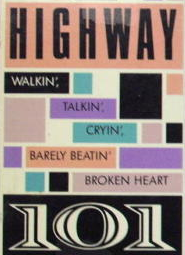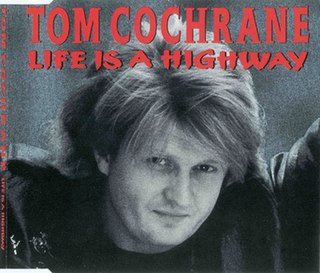
"Life Is a Highway" is a song by Canadian musician Tom Cochrane from his second studio album, Mad Mad World (1991). The song became a number-one hit in Canada in late 1991. "Life Is a Highway" also peaked at number six on the US Billboard Hot 100 chart in August 1992 and reached the top three in Australia and New Zealand the same year. The song was covered by Chris LeDoux for his 1998 album One Road Man and Rascal Flatts for the Cars soundtrack.

Highway 101 was an American country music band founded in 1986 in Los Angeles, California. The initial lineup consisted of Paulette Carlson, Jack Daniels (guitar), Curtis Stone, and Scott "Cactus" Moser (drums). Prior to the band's founding, Carlson was a solo artist. With her as lead vocalist, the band recorded three albums for Warner Bros. Records Nashville and charted ten consecutive Top Ten hits on the Hot Country Songs chart, four of which went to number one. After Carlson left in 1990 to pursue a solo career, the band recorded a fourth album for Warner with Nikki Nelson on lead vocals before exiting the label. One album each followed on Liberty, Intersound, and Free Falls Records under various lineups.

"You Got It" is a song from American singer Roy Orbison's 22nd studio album, Mystery Girl (1989). The song was released posthumously on January 3, 1989, after Orbison's death from a heart attack on December 6, 1988. The song was issued with "The Only One" as the B-side and was later released with "Crying". The single reached number nine on the US Billboard Hot 100 and number one on the Adult Contemporary chart, returning Orbison to the top 10 for the first time in 25 years. "You Got It" also reached number three on the UK Singles Chart in early 1989. Although it is an Orbison solo single, Orbison's fellow Traveling Wilburys bandmates, Tom Petty and Jeff Lynne, co-wrote the song and played instruments on the record.

"When a Man Loves a Woman" is a song written by Calvin Lewis and Andrew Wright and first recorded by Percy Sledge in 1966 at Norala Sound Studio in Sheffield, Alabama. It made number one on both the Billboard Hot 100 and R&B singles charts. Country singer John Wesley Ryles had a minor hit with his version of the song in 1976 while singer and actress Bette Midler recorded the song 14 years later and had a Top 40 hit with her version in 1990. In 1991, Michael Bolton recorded the song and his version peaked at number one on both the Billboard Hot 100 chart and the Billboard Adult Contemporary Singles chart.
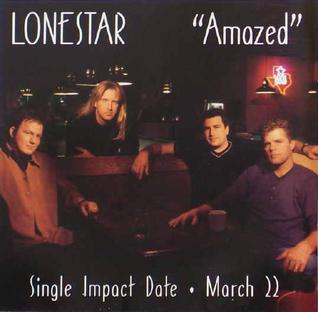
"Amazed" is a song by American country music group Lonestar, released on March 22, 1999, to country radio as the second single from their third studio album Lonely Grill (1999). The power ballad is the band's longest-lasting number one single and biggest hit, spending eight weeks at the top of the Billboard country chart. The song was written by Marv Green, Aimee Mayo, and Chris Lindsey. A pop remix of the song reached number one on the Billboard Hot 100 and number two on the Hot Adult Contemporary Tracks charts in 2000. The song has sold over 1,650,000 digital copies in the US as of February 2016.
"Good Times" is a song written and recorded by Sam Cooke, released as single in 1964.
"A Woman in Love" is a song written by Curtis Wright and Doug Millett, and recorded by American country music singer Ronnie Milsap. It was released in September 1989 as the third single from the album Stranger Things Have Happened. It was his last song to reach number one on the U.S. country singles chart.
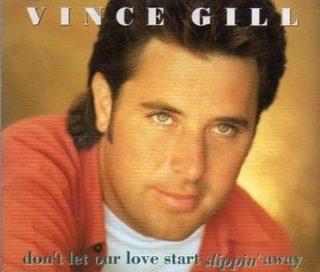
"Don't Let Our Love Start Slippin' Away" is a song co-written and recorded by American country music singer Vince Gill that reached the top of the Billboard Hot Country Singles & Tracks chart. It was released in October 1992 as the second single from his album I Still Believe in You. It reached number-one on the U.S. Billboard Hot Country Singles & Tracks and on the Canadian RPM Country Tracks chart. The song was written by Gill and Pete Wasner.
"Where Corn Don't Grow" is a song written by Roger Murrah and Mark Alan Springer. It was first recorded by Waylon Jennings on his 1990 album The Eagle, peaking at #67 on the country singles charts that year. Six years later, Travis Tritt covered it on his 1996 album The Restless Kind. Also released as a single, his rendition was a Top Ten country hit in 1997, peaking at #6 on the same chart. On April 12, 2021, rising country star Riley Green released a cover of the song in an ode to both Tritt and Jennings.
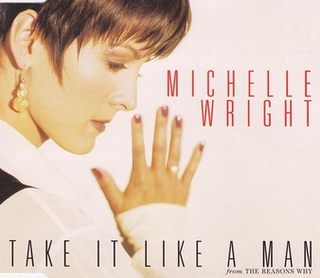
"Take It Like a Man" is a song written by Tony Haselden, and recorded by Canadian country music artist Michelle Wright. It was released in February 1992 as the first single from Wright's album Now and Then. The song became Wright's first Number One on the Canadian RPM Country Tracks charts that year. It was also her only top 10 hit on the Billboard Hot Country Singles & Tracks chart in the United States. Country singer Lari White is featured on background vocals.
"Who's Lonely Now" is a song written by Kix Brooks and Don Cook and recorded by American country music group Highway 101. It was released in September 1989 as the first single from their album Paint the Town. The song was Highway 101's ninth country hit and the last of four number one country hits. The single went to number one for two weeks and spent a total of twenty-six weeks on the country singles charts.
"Drive South" is a song written by John Hiatt, and recorded by him on his 1988 album Slow Turning. The song was later recorded by Kelly Willis on her 1990 debut album, Well Travelled Love. Neither versions were released as singles.
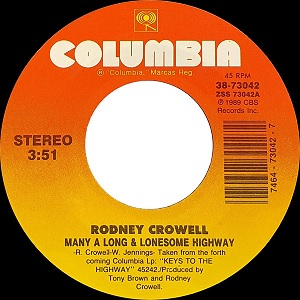
"Many a Long & Lonesome Highway" is a song co-written and recorded by American country music artist Rodney Crowell. It was released in September 1989 as the first single from Crowell's album Keys to the Highway. The song reached number 3 on the Billboard Hot Country Singles & Tracks chart in January 1990 and number 1 on the RPM Country Tracks chart in Canada. It was written by Crowell and Will Jennings.
"If Looks Could Kill" is a song written and recorded by American country music artist Rodney Crowell. It was released in January 1990 as the second single from Crowell's album Keys to the Highway. The song reached number 6 on the Billboard Hot Country Singles & Tracks chart in May 1990 and number 4 on the RPM Country Tracks chart in Canada.
"Dancy's Dream" is a song recorded by American country music group Restless Heart. It was released in April 1990 as the second single from the album Fast Movin' Train. The song reached number 5 on the Billboard Hot Country Singles & Tracks chart. It was written by Greg Jennings, Monty Powell and Tim DuBois.
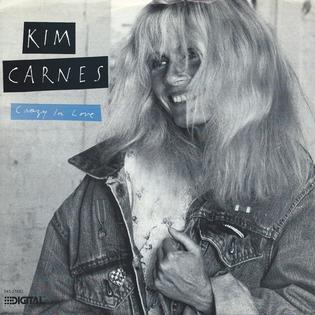
"Crazy in Love" is a song by songwriters Even Stevens and Randy McCormick; it was first recorded by Joe Cocker on his 1984 album Civilized Man. The song was covered by American pop artist Kim Carnes in 1988 and released as the second single from her album View from the House. Carnes' version peaked at number 13 on the Billboard Adult Contemporary chart and number 68 on the Billboard Hot Country Singles & Tracks chart.

"Setting Me Up" is a song written by Mark Knopfler. It was originally recorded by British rock group Dire Straits on their self-titled debut album but not released as a single. Ken Tucker in Rolling Stone described the song as a "heavenly number" combining humor with bitterness, despite having a typical messed-up romance theme. Tucker noted that the song's impact is enhanced by the growling tone in Knopfler's singing voice and by the song's country music-style guitar solo. Carly Darling in Billboard Magazine praised the song's rockabilly guitar but criticizes the lyrics.

"Bing Bang Boom" is a song written by Hugh Prestwood, and recorded by American country music band Highway 101. It was released in April 1991 as the first single and title track from their album Bing Bang Boom. The song reached number 14 on the Billboard Hot Country Singles & Tracks chart in June 1991.
"Someone Else's Trouble Now" is a song written by Pam Tillis and Gary Nicholson, and recorded by American country music band Highway 101. It was released in September 1990 as the only single from their Greatest Hits compilation album. The song reached number 14 on the Billboard Hot Country Singles & Tracks chart in December 1990.
"Feed This Fire" is a song written by Hugh Prestwood, and first recorded by American country music group Highway 101 on their 1988 album 101². The group did not release it as a single. The song was then recorded by Canadian country music artist Anne Murray in early 1990 for a summer release to radio. Murray's version was released in August 1990 as the first single from her album You Will. The song reached number six on the Canadian RPM Country Tracks chart in November 1990. In the U.S., the song peaked at number five on the Billboard Hot Country Singles chart for the week ending Saturday, November 10, 1990. It was Murray's last Billboard top ten country single in the United States.
